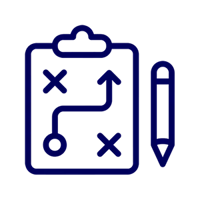
Clodagh McGuire
Trainee clinical bioinformatician at King's College Hospital NHS Foundation Trust
To get a place on the NHS Scientist Training Programme, demonstrate your interest and commitment to self-development by doing online training courses and watching webinars. It will help your application stand out when going through the competitive application process.
About Clodagh...
Who am I?
"The personality types I got were influencer, manager and quality controller. Management and influencing is important when developing and running new clinical services. As the NHS Scientist Training Programme is meant to develop future leaders of the NHS, these qualities (diplomacy, good with detail, leadership, being motivated, team oriented and adaptable) are important. As clinical services have to be in line with lab accreditation and follow standard operating procedures, maintaining quality and being trustworthy are also important. Everything we do is for the patients and could impact patient care so safety and managing risk is paramount. Having worked in communication and engagement roles previously, however, I'm surprised I didn't get the communicator personality type!"
What do I do?
"When someone develops cancer or has a rare disease they may be sent for genetic testing to understand the changes in their DNA that have led to them developing that disease. Your DNA is made up of 3 billion base pairs - that's a lot of data to look through to find the cause of a disease. In fact it would take you almost 10 years to read each base pair yourself! We develop computer programs to help sort through all this data and find differences so that it can be used by doctors when diagnosing their patients and deciding the best course of treatment."
How did I get here?
"I studied biology at university and when I finished I wanted to use my degree but not work in a laboratory. I felt this limited my options as no one talked about options beyond research in a laboratory and teaching. I worked for several years on scientific journals as an editor, publishing the results of clinical research and communicating research to the public until I was no longer satisfied with the challenge. I decided to retrain and use my degree in a different way. I obtained a place on the Scientist Training Programme, a competitive national scheme that trains you to become a qualified clinical scientist for the NHS. Clinical scientists are involved in the majority of patient diagnoses and there are lots of different clinical scientist roles in a wide range of areas from biology to physics to engineering. I am now working for an NHS trust and studying part-time for a fully funded masters as part of this programme."
The life I live
"I'm an avid reader and get through a lot of books; commuting to the office on the train provides the perfect opportunity to indulge in a book. I listen to podcasts, mostly true crime and usually while out walking or hiking. I run regularly; it's my stress relief, which sometimes is needed when you working full time as well as studying for a masters and have assignments to complete. One of my favourite things to do with my spare time though is volunteering at London Zoo, meeting new people and hopefully furthering their interest in wildlife conservation. And if I have my camera with me at the same time then I can indulge in my other hobby by photographing the animals."
My typical day
"As a bioinformatician, the majority of the day is spent at your computer. You could be developing a new piece of software as requested by one of the hospital labs, testing out a new tool to see if it meets your needs, fixing code that has broken or maybe writing updates to an existing tool in response to user feedback. We're considered a service delivery team as we work in response to the needs of other teams across the NHS trust (mostly in genetics), which means lots of communication with lab staff, managers, IT and external organisations. The NHS has recently launched a National Genomic Medicine Service so that all patients, no matter where they are in the country, can receive genetic testing as part of standard care, hopefully improving the time to receiving a diagnosis and treatment. Before this, patients with rare diseases could wait years and undergo hundreds of different tests before being diagnosed, if they ever received a diagnosis. Bioinformatics teams are heavily involved in this new testing service to ensure we can deliver the tests approved by the NHS and that data analysis is performed consistently each time a test is performed and in the timeframe required."
My qualifications
"After GCSEs I did the International Baccalaureate (IB) instead of A Levels because I liked the idea of being able to do more subjects than the three or four A Levels I would have done. I studied Biology, Chemistry, Maths, English, French, Geography and something called Theory of Knowledge, which was a bit like philosophy. However, despite enjoying the IB and a lot of teachers saying it better prepares you for university, I would probably do A Levels given the choice again. From my experience, A Levels seemed to be better understood by English universities than the IB as they didn't seem to consider the extra work that goes into the IB when giving out offers for places - while this didn't stop me getting a place at my first choice university, I know it made it difficult for some of friends to get in. I then studied for a BSc Biology degree that included a placement year in industry. I think the placement year was particularly important as it gives you a year of experience in full-time employment in a relevant field. It makes it easier for you to work out what field you want to go into upon graduating and sets you apart from other graduates when applying for jobs (in fact some people already had jobs to go into upon graduation because the company they did their placement year with offered them a job for once they graduated). Lots of universities offer placement years so it's definitely worth investigating this before making your choices.I am now studying part time for a masters in clinical bioinformatics."



